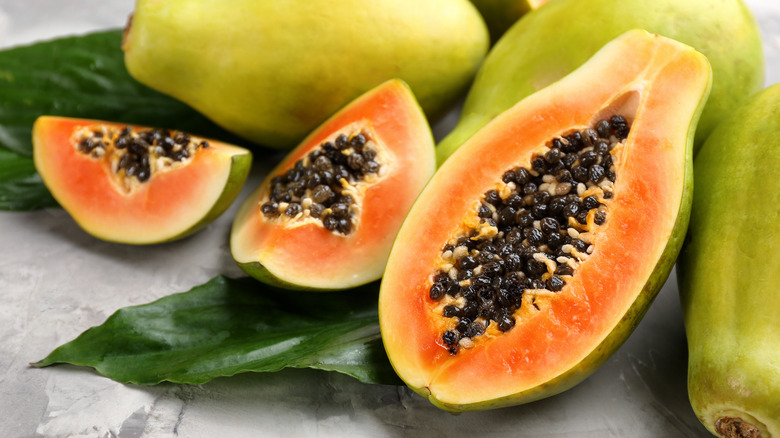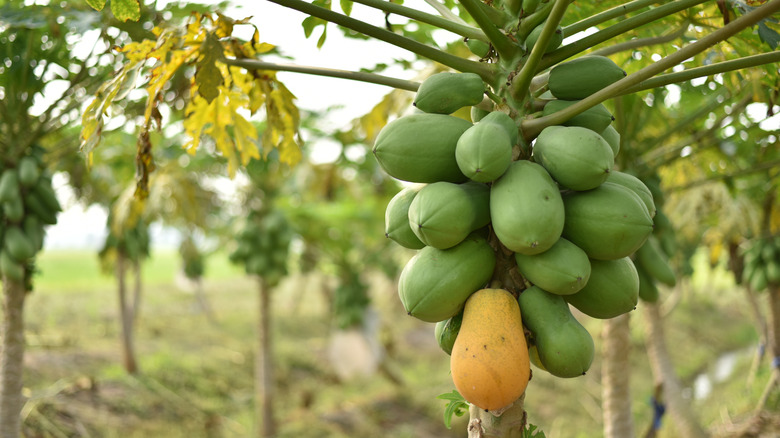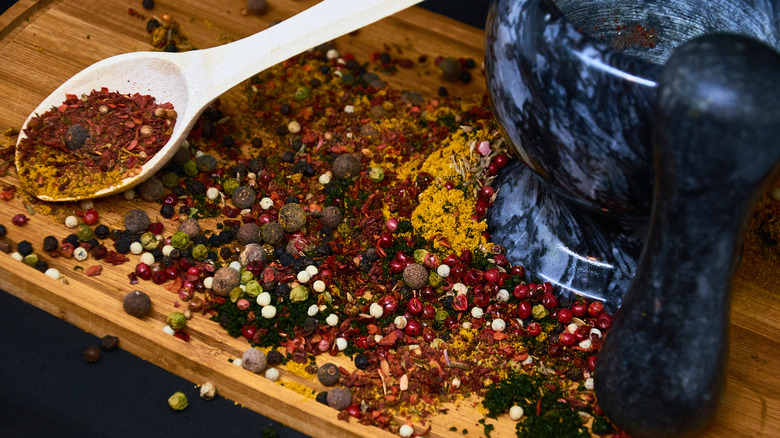Here's Why You Should Stop Throwing Out Papaya Seeds
Eating fruit seeds may seem unnatural, especially with childhood tall-tale warnings that ingesting a watermelon seed will make a giant oblong melon grow inside your stomach. That's unlikely to happen, says the grown-up versions of ourselves. But is it really okay to eat those seeds, or should they be tossed into the compost bin? That depends on the seed and the fruit it came from.
According to FruitStand, plenty of fruit seeds are nutritious, delicious, and fully edible, including those tucked inside pomegranates, kiwis, dragon fruit, guava, and yes, watermelons. Others, including the pits of stone fruits such as cherries and peaches, contain a smaller seed potentially harboring a chemical called amygdalin, which can turn into hydrogen cyanide as it travels through your digestive tract. Don't eat those.
So, where do papaya seeds fall on the relative spectrum from wonderful to terrible? Word on the culinary street is that you should stop throwing them out, and here's why.
A nod to good health
Good reasons exist for saving the seeds after slurping down the soft, juicy papaya. You've already done your heart a wealth of good from the antioxidants, fiber, and folic acid in the flesh, per WebMD, but don't overlook the potential health nuggets hiding in the seeds.
Healthline notes that papaya seeds are edible but also very high in nutrients, including essential micronutrients. Like their fleshy counterparts, the seeds carry antioxidant compounds to help prevent chronic diseases, and they contain beneficial monounsaturated fatty acids and fiber. Those mighty little warrior seeds can fight infection, prevent inflammation, protect kidney function, and improve digestive health. Some studies even hold hope for papaya seeds joining the war against cancer in humans.
For all that goodness, it still pays to only nibble papaya seeds in small amounts, at least until further studies allay fears of potential negative effects. Concentrated amounts of papaya seeds in non-human studies indicate the potential for reduced fertility and toxicity in cells and DNA. Healthline states this is easily sidestepped by limiting consumption to a few daily servings.
Snacking, grinding, and seasoning
An excellent reason to save those papaya seeds is for fun snacking and tasty seasoning. The crunchy texture holds up well to cracking and grinding, notes Everyday Health, and works well for seasoning food. They have an earthy, peppery flavor that perks up sauces, dressings, or nut and seed blends such as dukkah, explains Taste, which recommends rinsing and towel-drying, then baking the seeds on a tray for about 1.5 hours to dry them out. Using a mortar and pestle, crush them to the desired consistency.
Upscale Health's Youtube channel suggests adding powdered papaya seeds to your favorite spice blends or mixing them into smoothies, along with other flavors, if necessary, to reduce the peppery punch. Another option is to make a papaya-seed marinade using lemon, garlic, cream, and other ingredients to your liking.
Herbal Goodness notes that you can eat papaya seeds on their own after drying for about a day. If you can handle the spicy flavor, which sometimes has a slight horseradish taste, try sprinkling them on a salad along with sesame or other lighter-tasting dried edible seeds.


